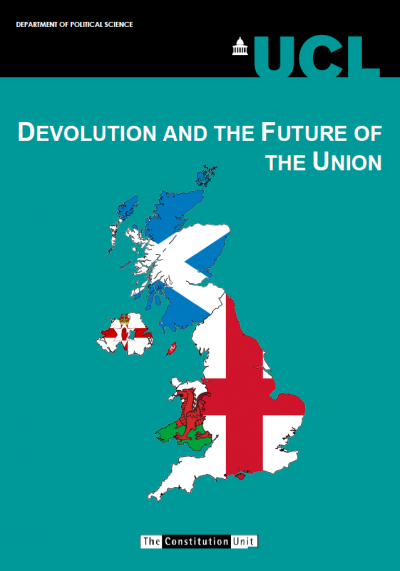Press Release: Devolution and Future of the Union: The Challenge for the new Parliament
5 May 2015
A new report by the Constitution Unit
On the eve of the election the Constitution Unit publishes today a new report on Devolution and the Future of the Union. Its analysis will survive well into the new Parliament, whoever forms the next government. The report explores future challenges to the Union, with all parties committed to further devolution, a resurgent SNP, and the Conservative promise of English votes for English laws. These issues will all feature in the post-election negotiations between the parties, with growing tensions between England and Scotland, and a risk that hasty deals could end up undermining the Union.
"Devolution and the future of the Union will be dominant issues in the next Parliament" said the report's lead author Prof Robert Hazell, director of the Constitution Unit. "All the main parties are strongly committed to further devolution, in England as well as in Scotland, Wales and Northern Ireland. But no party has thought through the consequences, or the spill over effects from one part of the UK to another. Nor has anyone systematically asked, how much further devolution there can be without starting to undermine the Union. That is what our report set out to do".
The report's findings and conclusions include:
- Analysis of the pros and cons of further devolution, up to full fiscal autonomy. Without intending it, these changes could render the UK ungovernable, or lead to its break up as a state
- Whitehall lacks capacity to think about the Union, with six centres for devolution policy. This will not change so long as there are three territorial Secretaries of State with separate offices. There needs to be a single senior Cabinet minister responsible for devolution and the Union
- English votes on English laws will be difficult to introduce, for technical and political reasons. The coalition government produced four different options, with even the Conservatives failing to agree.
- Further devolution will raise the question whether Scotland, Wales and Northern Ireland should have equal representation with England. The boundary review, to be revived in 2015-18, would have reduced Scotland from 59 to 52 seats, and Wales from 40 to 30.
- A second chamber representing the nations and regions would be unlikely to bind the Union together. To do that, good intergovernmental relations between the UK and devolved governments is far more important than the design of the second chamber.
- A citizens' convention could prove a useful forum for taking debates about devolution and the future of the Union beyond the political parties. But the challenge is to devise an agenda and terms of reference which are manageable, and deliverable within a reasonable timescale. If it becomes a reason to delay further devolution, it may not be supported by the devolved governments.
"These are the issues which all parties need to grasp in the new Parliament if the future of the Union is to be dealt with in a sensitive and orderly way", concludes Professor Hazell.
Notes for Editors
- The Constitution Unit is an independent, non-partisan research centre based in the Department of Political Science at University College London.
- The Executive Summary of the report is available here
- The full report is available here
- Robert Hazell is available for interview. Contact Ben Webb on ben.webb@ucl.ac.uk or 020 7679 4977, or Brian Walker on 07802 176 347.
 Close
Close



